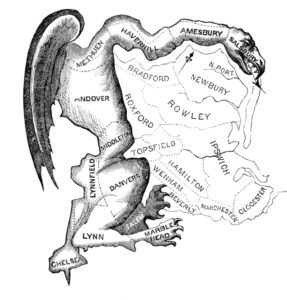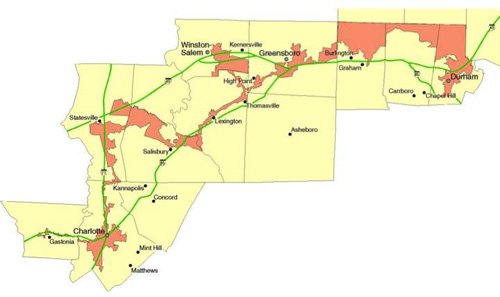 WINSTON-SALEM (May 22, 2017) – On the same day the U.S. Supreme Court struck down North Carolina’s congressional districts as unconstitutional, former UNC President Tom Ross laid out a simple way to make drawing state and national districts less partisan.
WINSTON-SALEM (May 22, 2017) – On the same day the U.S. Supreme Court struck down North Carolina’s congressional districts as unconstitutional, former UNC President Tom Ross laid out a simple way to make drawing state and national districts less partisan.
“(It’s) very closely tied to the future of higher education, because it’s very closely tied to our representative democracy,” Ross said at a dinner sponsored by the Crosby Scholars, which has helped 10,000 students in Forsyth, Iredell and Rowan counties prepare for college.
Millions of Americans have lost faith in their political system and the gridlock it’s produced, Ross said, noting that despite hotly contested races, less than half of eligible voters took part in the 2016 election.
“In today’s world, the way we draw districts is actually damaging democracy more than it is protecting it. And that’s because we’re allowing the politicians to draw their own districts. The politicians are able to pick their voters instead of the voters picking politicians,” he said.
Ross gave a brief history of gerrymandering, starting with Massachusetts Gov. Elbridge Gerry’s approval of state legislative districts slanted toward Republicans in 1812. One in particular looked like a salamander, and Gerry’s name was combined with the word ‘salamander’ to create ‘gerrymander.’
The questionable tradition has continued for 200 years. Ross pointed to how Democrats in the General Assembly drew North Carolina’s 12th Congressional District in 1992 and Republicans drew it in 2011.
“It’s a problem, because you end up with a whole bunch of safe districts,” he said.
Whether they are safe Democratic or safe Republican districts, he said, “The decision about who the winning candidate’s going to be is decided in the primary. So unless you vote in that primary … you don’t have any say-so.… And that means a lot of people’s vote and voice is no longer heard.”
As a result, politicians don’t have to listen to most voters, Ross said.
“What matters is the people in their party primary. And their biggest fear, they’ll tell you, is being attacked from somebody who is further to the extreme of their party – further right, further left. It’s called being ‘primaried’ – that’s a new word we use. That’s what they worry about.
“So what do they do? They tend to move closer to the people who might ‘primary’ them, so they can avoid a contest. And they’re also afraid to compromise with anybody, because they don’t want to be criticized for having worked with the other side.
“So you end up with gridlock – nobody will work with anybody. Nobody’ll compromise. Nobody will work for solutions to very important problems we face in our society.”
To show how slanted North Carolina’s current districts are, Ross noted that 53% of voters in state elections last year voted for a Republican congressional candidate and 47% for a Democratic candidate. Applying those percentages to the state’s 13 congressional races should have produced 7 Republican and 6 Democratic members of Congress.
Yet the actual result was 10 Republicans and 3 Democrats. And no candidate won with less than 56% of the vote – hardly competitive.
“So who do we blame?” Ross asked. “I think we ought to blame the Republicans. And I think we ought to blame the Democrats. I spent 17 years as a judge … and I know guilty when I see it. They’re both guilty.
“It may be helping them, but it’s hurting democracy – it’s killing democracy, in my view,” he said.
Removing party registration and voting history from the criteria used to draw districts would result in more competitive districts, Ross said.
In a project at Duke University last year, Ross convened a panel of retired judges and Supreme Court justices – five Democrats and five Republicans – to draw districts without regard to partisan politics.
The districts the judges produced were more compact than those drawn by state legislators. A political analysis later projected that 6 of the districts leaned Republican, 4 leaned Democrat and 3 were toss-ups.
“About exactly where the voters are,” Ross said. “So you can do this in a fair way. You can do this in a way that would result in politicians having to pay attention to voters.”
Voters from both parties should care about the issue, he said, because neither party will stay in control forever.
“We can fix this, but … we’re going to have to send a message to the politicians that we’d like to pick our own politicians, instead of the politicians picking which voters they want.
“We have to say to them, ‘Enough’s enough – we want fairness. We demand that you pay attention to our democracy first, and not your party.’ If we do that, I believe we can accomplish reform, I believe we can restore representative democracy and have it function – function for us, to solve problems we have.”
Such a process might just produce officials from both parties who believe – as the vast majority of North Carolinians do – that public higher education is vital to the future of our state.




Grady Franklin says
President Ross is correct. Modern day gerrymandering is a direct cause of the undermining of our democracy and our representative government. The will of the people should be a guiding force in our elections. The examples cited by President Ross show clearly this is no longer the case. Our elections are so rigged it will be difficult to get through to our politicians whose primary interest seems to be assuring their reelection. I fear our courts may be our last best chance of ending gerrymandering, but a concerted effort is now underway to politicize them as well. The Supreme Court needs to realize the threat to democracy posed by gerrymandering. The U.S. Constitution was designed to protect our democracy. If the court fails to rule the threat of gerrymandering unconstitional, they will have failed to carry out their basic function envisioned by the founding fathers.